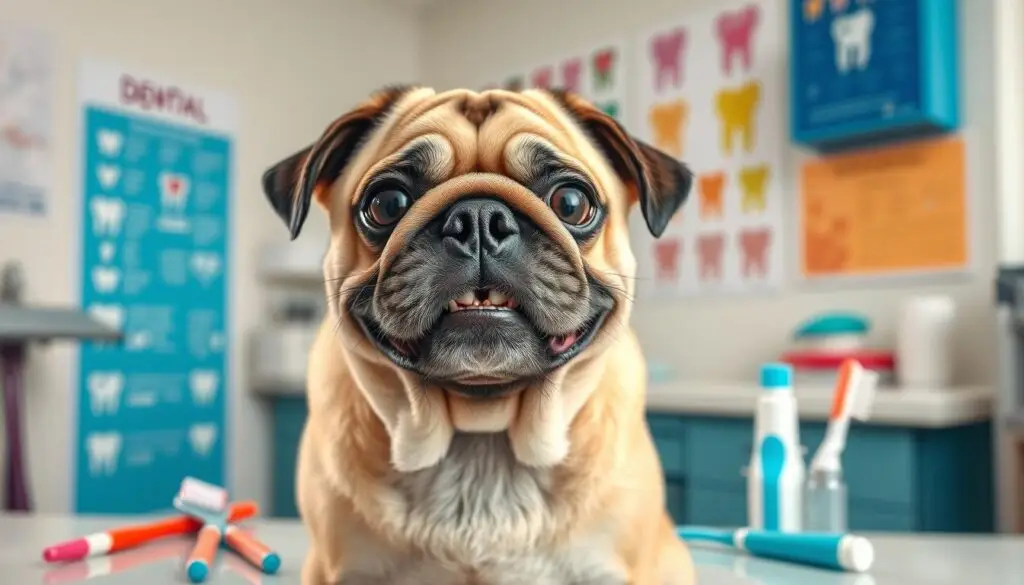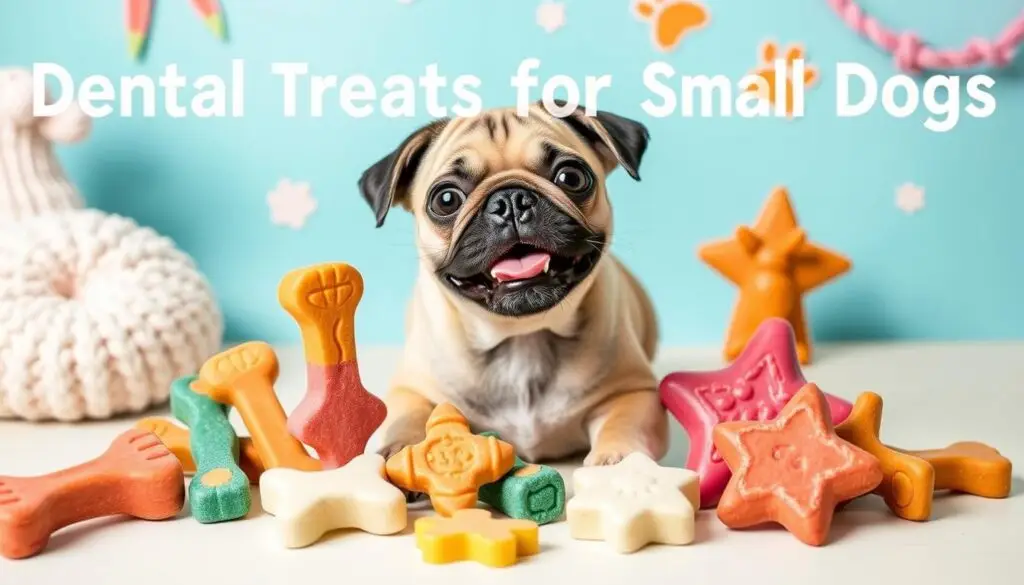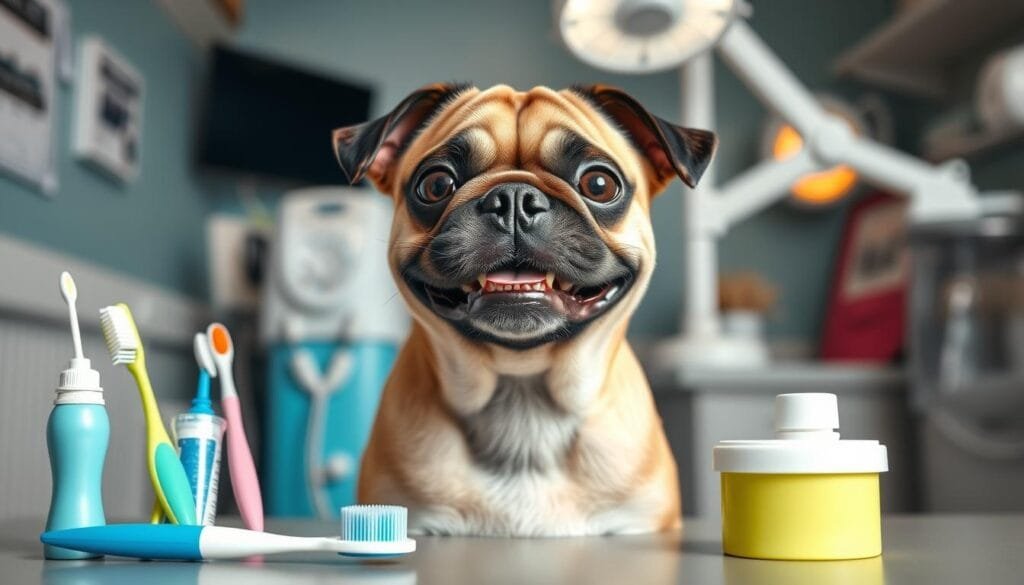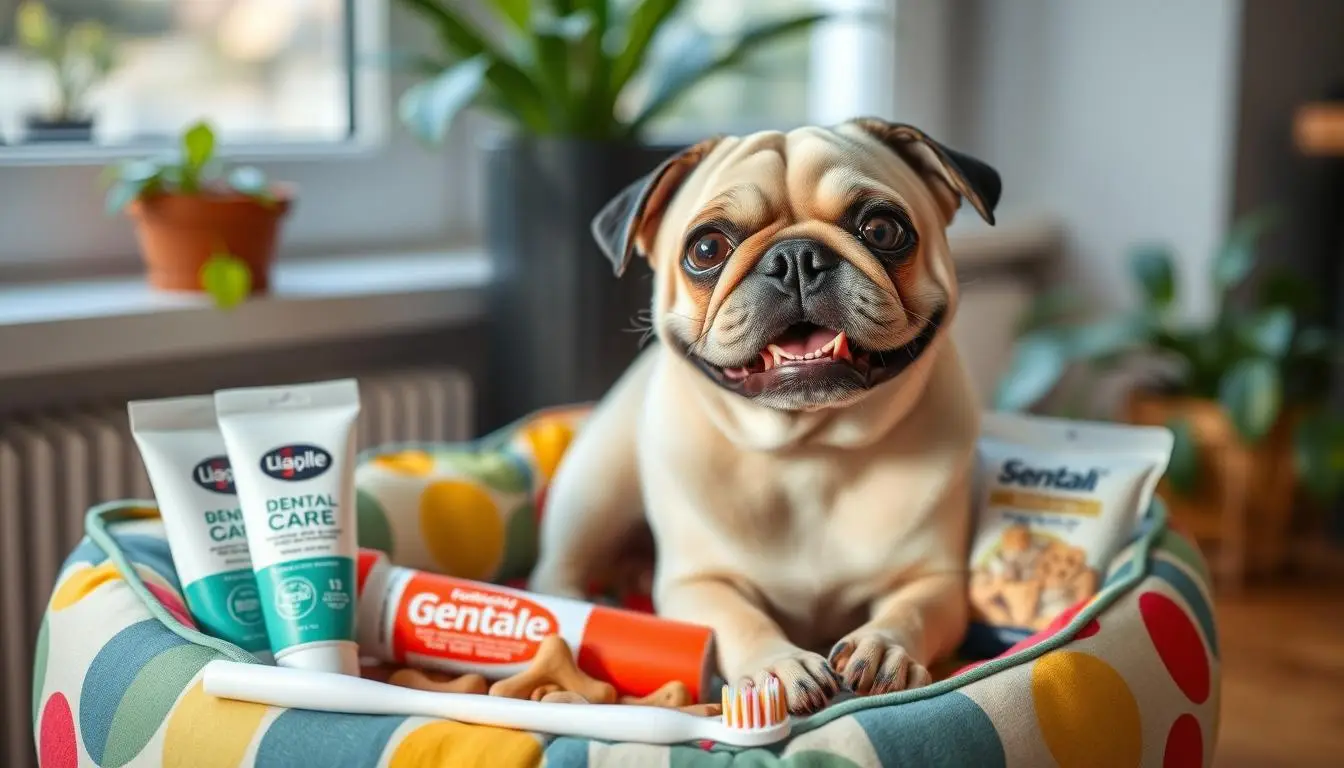Did you know over 80% of dogs show signs of periodontal disease by age three? This is especially true for small dogs with short snouts, like Pugs and French Bulldogs. These breeds face big challenges in keeping their teeth clean and healthy.
Short-snouted dogs often have crowded teeth and gum disease. As a pet owner, it’s important to know how to help them and prevent them to have bad teeth. This ensures their dental health stays good.
In this guide, we’ll cover the importance of dental check-ups and at-home care. We’ll also share tips for small dogs with short snouts. By focusing on their oral health, you can prevent dental problems and keep their smile bright.
Key Takeaways
- Small dogs with short snouts have unique dental challenges due to their oral anatomy
- Regular dental check-ups are crucial for preventing common oral issues
- At-home dental care routines should include brushing with the right tools and techniques
- Diet, dental treats, and water additives can support optimal oral health
- Recognizing signs of dental problems early is key to timely treatment
Understanding the Unique Dental Challenges of Short-Snouted Dogs
If you own a small dog with a short snout, like a pug or bulldog, you need to know about their dental challenges. These cute dogs also known as brachycephalic dogs, which are characterized by their short, flat faces and compressed snouts.. They have special teeth needs that needs proper care to prevent dental problems.
Common Brachycephalic Breeds
Some popular brachycephalic breeds include:
- Pugs
- Bulldogs (English, French, and American)
- Boston Terriers
- Shih Tzus
- Boxers
Brachycephalic Breeds and Their Oral Anatomy
Due to their short snouts and flat faces, their teeth often get crowded because their jaws are smaller than other dogs. This crowding can cause their teeth to grow in wrong directions and increases the risk of dental disease.
These dogs also have shallow tooth sockets, making their teeth more likely to fall out. Their short snouts can make breathing hard, which might affect their oral health.
Common Dental Issues in Small Dogs with Short Snouts
Small dogs with short snouts face unique dental problems. Some common issues include:
- Periodontal disease: This is caused by plaque and tartar buildup, leading to gum inflammation and infection. If not treated, it can cause tooth loss.
- Tooth decay: Their crowded teeth trap food, leading to cavities.
- Malocclusion: Misaligned teeth can be painful and might need orthodontic treatment.
| Breed | Common Dental Issues |
|---|---|
| Pugs | Periodontal disease, tooth crowding, malocclusion |
| Bulldogs | Tooth decay, gum inflammation, shallow tooth sockets |
| French Bulldogs | Overcrowded teeth, tooth loss, periodontal disease |
Knowing the dental challenges your short-snouted dog faces helps you take care of their teeth. This can prevent painful dental problems.
Importance of Regular Dental Check-Ups for Your Small Dog
As a pet parent to a small dog with a short snout, their dental health is key. Regular vet visits are crucial for preventing dental disease and keeping them healthy.
Higher Risk of Dental Issues
Small dogs with short snouts face more dental problems. Their teeth and jaw shape make it easy for plaque and tartar to build up. This can lead to serious dental diseases.
“Dental disease is one of the most common health problems in dogs, especially in small breeds with short snouts. Regular check-ups and cleanings are essential for preventing painful and potentially life-threatening conditions.” – Dr. Sarah J. Wooten, DVM
Improves Overall Health
Good oral hygiene is vital for brachycephalic breeds. It keeps their teeth and gums healthy and boosts their overall health. Dental infections can harm vital organs like the heart and kidneys. Early detection and treatment through regular vet visits can help your dog live longer and healthier.

Reduces Pain and Discomfort
Dental problems can cause a lot of pain and discomfort for your dog. This can make it hard for them to eat, play, and enjoy life. Regular dental check-ups help catch and treat problems early, reducing pain and discomfort.
Here’s a dental check-up schedule for your small dog with a short snout:
| Age | Check-Up Frequency |
|---|---|
| Puppy (up to 1 year) | Every 3-4 months |
| Adult (1-7 years) | Every 6-12 months |
| Senior (7+ years) | Every 3-6 months |
By sticking to a regular dental check-up schedule and following dental health tips, you can help your dog stay healthy and pain-free.
At-Home Dental Care Routines for Small Dogs with Short Snouts
Keeping up with at-home dental care for small dogs with short snouts is vital. A regular tooth cleaning routine can stop dental problems and keep your dog’s teeth shiny and healthy.
Choosing the Right Toothbrush and Toothpaste
When picking a toothbrush for your small dog, think about a few things:
- Size: Pick a toothbrush with a small head and soft bristles that fit well in your dog’s mouth.
- Style: Finger toothbrushes or gauze on your finger work great for flat-faced pups.
- Toothpaste: Use a pet-safe toothpaste with a tasty flavor to make brushing fun for your dog.
Techniques for Brushing Your Small Dog’s Teeth
Here’s how to brush your small dog’s teeth effectively:
- Gently lift your dog’s lips to show their teeth and gums.
- Brush the outer teeth in circles, focusing on the back molars.
- Brush the inner teeth, especially where they meet the gumline.
- Give your dog treats and praise to make tooth brushing a positive experience.
Frequency and Duration of Brushing Sessions
The right amount of tooth brushing for snub-nosed breeds depends on their needs. But here’s a general rule:
| Age | Frequency | Duration |
|---|---|---|
| Puppies (3-6 months) | 2-3 times per week | 1-2 minutes |
| Adult dogs (6+ months) | Daily or at least 3-4 times per week | 2-3 minutes |
Consistency is crucial for at-home dental care for your small dog with a short snout. Brushing teeth daily helps keep your pet’s mouth healthy and avoids dental issues later.
Dental Health Tips for Small Dogs with Short Snouts
Keeping your small dog’s teeth clean is key. You need a good diet, dental treats, and oral care products. These steps help avoid dental problems and keep their mouth healthy.
Diet and Nutrition for Optimal Oral Health
Feeding your dog a balanced diet is essential. Choose high-quality dog foods made for small breeds. Look for foods that help clean teeth and support gum health.
- Crunchy kibble to help scrape plaque off teeth
- Dental-specific diets with larger kibble size
- Foods with added vitamins and minerals for gum health
Dental Treats and Chews for Short-Snouted Dogs
Dental treats and chews are great for your dog’s teeth. When picking dental treats, think about these points:
| Treat Type | Benefits | Considerations |
|---|---|---|
| Enzymatic dental chews | Contains enzymes that help break down plaque and tartar | Soft texture suitable for short snouts |
| Dental bones | Encourages chewing to scrape away plaque | Choose size appropriate for your dog’s mouth |
| Dental sticks | Helps remove plaque and freshens breath | Look for options designed for small breeds |

Water Additives and Oral Rinses
Water additives and oral rinses boost your dog’s dental health. Add them to their water or apply to their teeth and gums. They contain ingredients like:
- Chlorhexidine to reduce plaque and gingivitis
- Xylitol to help prevent bacteria growth
- Enzymes to break down tartar
Remember, while dental treats, chews, and rinses can help maintain your dog’s oral health, they should not replace regular brushing and professional dental check-ups.
By following these tips, you can keep your dog’s teeth and gums healthy. This prevents dental pain and keeps them feeling their best.
Signs of Dental Problems in Small Dogs with Short Snouts
As a pet owner, knowing the signs of dental problems in your small dog is key. Spotting these symptoms early can prevent serious oral health issues. Here are common signs of dental disease in short-nosed dogs:
Bad Breath and Discoloration
Bad breath, or halitosis, is a clear sign of dental issues in small dogs. If your dog’s breath smells strongly, it might mean they have periodontal disease or tooth decay. You might also see yellow or brown stains on their teeth, showing plaque and tartar buildup.
Changes in Eating Habits or Behavior
Dental pain can change how your dog eats and acts. Look out for:
- Reluctance to eat or chew
- Favoring one side of the mouth while eating
- Dropping food from the mouth
- Excessive drooling
- Pawing at the mouth or face
These behaviors suggest your dog might be in pain. If you see these signs, talk to your vet to find out why and get the right treatment.
The table below lists common signs of dental problems in small dogs with short snouts:
| Category | Symptoms |
|---|---|
| Bad Breath and Discoloration |
|
| Changes in Eating Habits or Behavior |
|
Watching your dog’s oral health closely can help prevent dental disease. Regular vet visits and following dental care routines are crucial. This way, your dog can keep a healthy, pain-free smile.
Professional Dental Cleaning and Treatment Options
Keeping your brachycephalic breed’s teeth clean is key. Regular vet visits for tooth cleaning are vital. They help prevent and treat dental problems common in small dogs with short snouts.
Your vet will do a detailed oral exam and take x-rays during a dental cleaning. They’ll scale and polish your dog’s teeth. This removes plaque and tartar, which can lead to periodontal disease and other issues.

For serious cases, your vet might suggest extra treatments. These could include:
- Tooth extractions for severely damaged or infected teeth
- Periodontal surgery to address gum disease
- Endodontic treatment for damaged or infected tooth pulp
“Professional dental cleanings are essential for maintaining the oral health of small dogs with short snouts. By catching and treating dental issues early, we can help prevent more serious health problems down the line.”
The need for dental cleanings varies by dog. Some need them once a year, while others more often. Your vet will decide the best schedule for your dog based on their health and risk factors.
Remember, professional dental care is just one aspect of a comprehensive oral hygiene routine for brachycephalic breeds. Regular vet visits, at-home tooth cleaning, and a balanced diet are all important. They help keep your small dog with a short snout smiling and healthy for years.
FAQ
Q: Why is it important to maintain oral hygiene for my dog?
A: Maintaining oral hygiene is crucial for your dog’s overall health. Dental problems in dogs can lead to serious health issues if left untreated, including periodontal disease and infections that can affect their organs. Plus, nobody wants their furry friend to have stinky breath!
Q: How often should I brush my dog’s teeth?
A: Ideally, you should brush your dog’s teeth daily. However, if you can do it a few times a week, that’s still a win! Regular tooth brushing helps prevent common dental problems and keeps your canine’s smile bright.
Q: What are some common dental problems in dogs?
A: Some common dental problems include plaque buildup, gingivitis, periodontal disease, and even loose teeth. Just like humans, dogs can suffer from a variety of dental issues that can affect their health and well-being.
Q: Can I use human toothpaste to brush my dog’s teeth?
A: Absolutely not! Human toothpaste can be harmful to dogs. Instead, use toothpaste specifically formulated for dogs that is safe for them to swallow. Many dog breeds enjoy the taste, making it a more pleasant experience for both of you!
Q: How can I tell if my dog has dental disease?
A: Signs of dental disease include bad breath, swollen gums, difficulty eating, and excessive drooling. If you notice any of these symptoms, it’s time for a veterinary visit to get those pearly whites checked out!
Q: What are dental sticks and do they really help?
A: Dental sticks are tasty treats designed to help clean your dog’s teeth while they chew. They can aid in reducing plaque and tartar buildup, making them a great addition to your canine’s oral hygiene routine, but they shouldn’t replace brushing!
Q: When should I start brushing my puppy’s teeth?
A: It’s best to start brushing your puppy’s teeth when they still have baby teeth. This helps them get used to the process early on. As they grow and their adult teeth come in, they’ll be more accustomed to the idea of tooth brushing.
Q: How often should my dog have professional teeth cleaning?
A: Most dogs should have their teeth professionally cleaned at least once a year, though some breeds may require more frequent cleanings. Your veterinarian can help you determine the right schedule based on your dog’s needs.
Q: Are there any specific care tips for small breed dogs?
A: Small breed dogs often have crowded teeth, making them more prone to dental problems. Regular brushing, dental checkups, and professional teeth cleaning are essential. Consider adding dental chews to their diet for extra protection!
Q: What should I do if my dog has rotated teeth?
A: If you notice rotated teeth or other dental issues, it’s important to consult your veterinarian. They can assess the problem and recommend treatments or procedures to ensure your dog’s mouth stays healthy and happy!
Conclusion
As a pet owner, taking care of your small dog’s teeth is key, especially if they have a short snout. Understanding their oral hygiene needs is important. This article has shared tips to help keep your dog’s teeth healthy.
Make sure to take your dog to the vet for dental checks often. Start a regular dental care routine at home. Also, feed them a balanced diet and give them dental-friendly treats. This way, you can catch dental problems early and keep your dog happy and healthy.
Your dog’s dental health is up to you. Work with your vet and follow these tips every day. This will help your dog keep a healthy smile for many years.








